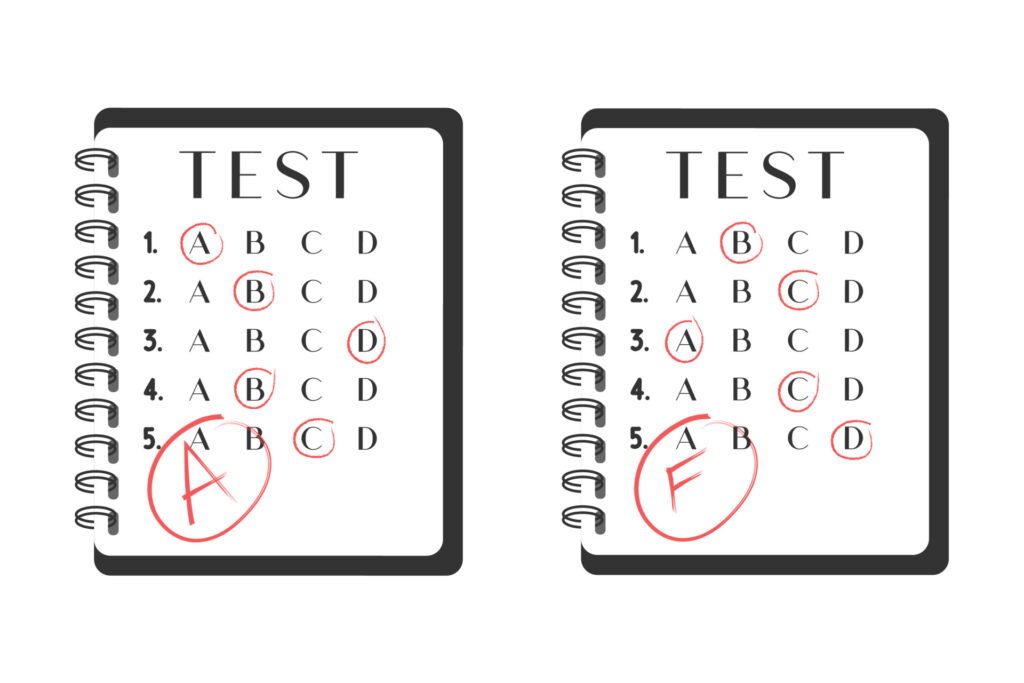

THE DREADED MULTIPLE CHOICE QUESTIONS!
Multiple choice questions often test a range of skills, from reading comprehension and vocabulary to grammar and critical thinking capabilities. Normally posed in a format where a question or statement is followed by several answer options (usually four), these questions may challenge your child’s understanding of subtle linguistic nuances, inferential reasoning, and context clues. With the increasing prevalence of standardized testing, equipping your child with the skills and strategies to navigate these assessments can make a world of difference.
Types of Questions 
They may include direct questions about a text, interpretative inquiries that require your child to deduce meaning, or questions that test grammatical usage and structure. Familiarizing your child with these different types can guide their focus during study sessions.
Common Pitfalls
Students often find themselves misled by distractors—answers that seem plausible but are ultimately incorrect. Another problem is not fully understanding the questions which can be convoluted or feel misleading.
Tips to Build Skills
Read the Questions before reading the material, this helps your child to know what they are looking for in advance and gets the brain to start thinking about the material on a deeper level before even beginning.
Reframe the Question! Have your child practice putting the question into their own words. This creates clarification and a deeper understanding of what they are looking for.
If time, do a “light read” first in which they get a broad understanding of the material and can ask themselves some questions, then do a Critical Reading.
Critical Reading! Encourage your child to engage deeply with texts. This means pinpointing the main ideas, themes, and details, and understanding the author’s purpose and tone. Practicing active reading by highlighting important points or jotting down notes can foster engagement.
Context Clues! Teach your child to look for context clues in questions and answer choices. Understanding the surrounding text often sheds light on unknown words or ambiguous phrases.
Grammar Knowledge! A solid foundation in grammar is essential. Regular practice with sentence construction, subject-verb agreement, punctuation, and parts of speech will ensure your child feels comfortable when they encounter grammatical questions.
Study Techniques
Create a Structured Study Plan: Help your child develop a study schedule that breaks down their review into manageable chunks. Maybe certain days are vocabulary, while others are reading comprehension practices.
Simulate Test Conditions: Every so often, have your child complete a practice test under timed conditions. This not only helps them practice time management, but also allows for an evaluation of their comfort level with the material.
Discuss Mistakes: After your child takes practice tests, go over their incorrect answers together to highlight misunderstandings and of course their correct choices. Reflection helps solidify understanding.
Helpful Resources
Online Practice Tests: Khan Academy and Quizlet offer practice questions and great tips specifically designed for kids preparing for standardized tests. These platforms often simulate the experience of actual tests, building familiarity and reducing anxiety.
Educational Apps: “Magoosh SAT Prep” or “Duolingo” incorporate language skills into fun games and practice questions. These can make studying less daunting and more enjoyable for your child.
Reading Comprehension Books: Look for workbooks that focus on reading comprehension and multiple choice questions. Books like “Reading Comprehension for Dummies” can be both accessible and thorough, helping to reinforce strategies. ISEE is a great way to practice, Ivy Global offers online and books.
Engaging with Literature: Encourage your child to read widely—both fiction and nonfiction. Discussing books can strengthen their analytical skills. Taking turns summarizing chapters or quizzing one another on key elements can create an enjoyable learning experience.
Tutoring Services: If your child is struggling, consider enlisting the help of a tutor who specializes in English language arts. One-on-one attention can target their specific weaknesses while providing tailored strategies for improvement.We are always here at Elite Tutoring to give the help you need.
